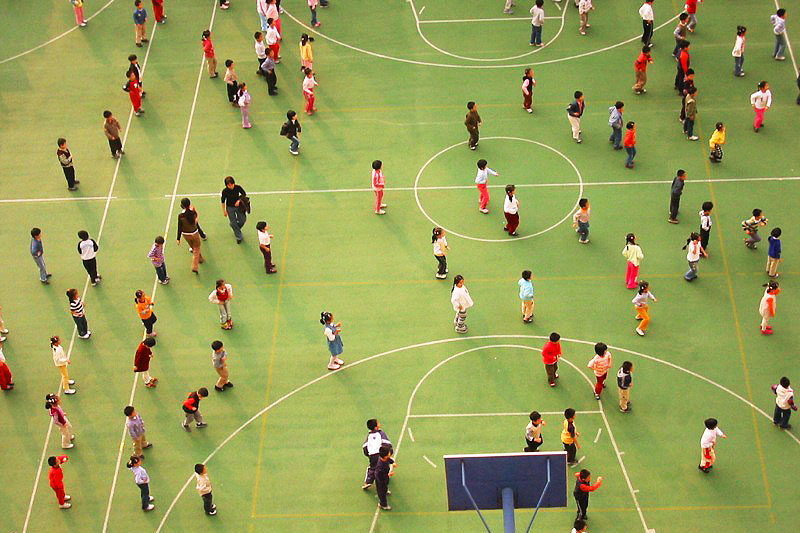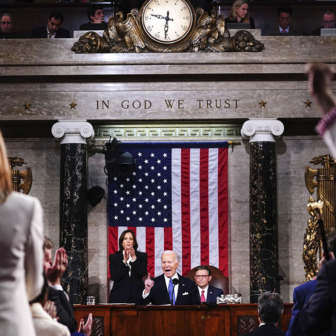Who’s Afraid of the Big Bad Dragon? Why China Has the Best (and Worst) Education System in the World
By Yong Zhao | Jossey-Bass | $33.95
What is going on when a slim volume of vigorous but tendentious polemic (about schooling in China, of all things) earns an extended and glowing review (“the book that Barack Obama, Arne Duncan, members of Congress and the nation’s governors and legislators need to read”) from one of America’s most prominent public intellectuals (Diane Ravitch) in America’s most prestigious journal of ideas (the New York Review of Books)?
Both Yong Zhao and Ravitch address an American audience, but for reasons indigenous and imperial what they have to say is as instructive here as it is in the United States, although not necessarily in ways intended.
While most of Who’s Afraid of the Big Bad Dragon? is devoted to describing and explaining China’s schooling and Western perceptions of it, the bullseye in Zhao’s target is the OECD’s hugely influential PISA (Programme for International Student Assessment) and its tests of reading, maths and science. It is PISA that put Shanghai’s school system at the very top of the top international league table; it is PISA that relegated the United States to the middle of the ruck; and it is PISA that supplied the Gillard government with its loftiest ambition for our schools (“top 5 by ’25”!).
In Zhao’s view, the OECD’s league tables and the tests on which they rest are dangerous nonsense that has suckered credulous Western audiences into thinking that PISA reflects the realities of China’s schools (and ours), and persuaded them that the Chinese way is the way of the educational future. He argues that pseudo-science has disguised and excused a Chinese chamber of educational horrors – a system of deadening conformity, of rote learning and routine, of competition carried to the point of cruelty, and riddled with cheating, bribery and fraud. In Australia, the United Kingdom and the United States, it has had the perverse effect of promoting a destructive “reform” agenda involving narrow measures of a narrow curriculum in the misanthropic causes of accountability, “performance,” and competition between schools and school systems.
Zhao is well placed to make the case, and some of the case is very well made. Born and schooled in China, he went to the United States as a graduate student in the early 1990s, and flourished. He is a prolific writer, software designer, and commentator in America and elsewhere, including Australia.
Zhao is correct to argue that PISA and its findings are abused by their sponsor, among many others. PISA is often taken as a proxy measure of “quality” – indeed of the quality of an entire school system. Hence, for example, the Grattan Institute’s 2012 report, Catching Up, and its portentous opening sentence: “Today’s centre of high performance in school education is East Asia.”
As Zhao points out, PISA reports on just three areas of the curriculum (plus, in the most recent round, “problem-solving”), and on only some aspects of those three areas. It concentrates heavily on “cognitive” to the exclusion of “non-cognitive” learning (collaboration, listening, communication, time-management, impulse control and so on). There is clear evidence to support Zhao’s contention that, in the United States at least, standardised testing is both narrow and narrowing.
Zhao raises some very awkward questions about the OECD’s assumption that one test can assess the same thing in the same way across very different cultures in dozens of national school systems. And he is right to attack the OECD’s use of league tables that make the implicit claim that #1 is “better” than #2 even if #2 is just microns away from #1 according to an instrument that would be lucky to measure in metres.
But Zhao’s debunking needs some debunking too. He (rightly) attacks the OECD and others for conflating “test results” with “quality,” but proceeds to do some conflating of his own. He routinely refers to “China’s schools” and “Chinese students” when PISA and the OECD focus on Shanghai, a city containing around 2 per cent of China’s population, and product of a distinctive history of commerce and contact with the West.
Zhao dismisses PISA’s results as meaningless, but doesn’t mention that they are broadly consistent with the findings of other international and national testing regimes, nor notice that his explanation of Chinese students’ success tacitly accepts the legitimacy of PISA’s results. He attributes that success to endless drill and coaching, competition, and the authoritarian culture of China’s classrooms, schools and systems, but doesn’t mention a significant body of research which suggests that at least some Chinese maths teachers (for example) take an approach that, in some key respects, is more “progressive” than their Western counterparts.
Nor is there discussion of arguments that high levels of student performance are associated with an organisation of teachers’ work and professional development superior to those found in the United States (and in Australia). And the most interesting phenomenon of all, the extraordinary rates of improvement in East Asian performance in PISA and other international comparisons, likewise goes unremarked.
While Zhao points out that PISA addresses only three of seven or eight key areas of the curriculum, he doesn’t acknowledge that those three areas – reading, maths and science – provide the tools of learning in other areas. He draws on the work of eminent US scholar Henry M. Levin to suggest that the “non-cognitive” skills ignored by PISA are increasingly valued and valuable in the workplace. But Zhao – who wants to get rid of standardised testing altogether – doesn’t report Levin’s recommendation that PISA-style tests be retained, complemented by tests of non-cognitive learning.
The problem underlying all these problems is a cast of mind that presumably owes something to the trajectory of Zhao’s life. His readers are asked to choose between “authoritarianism” and creativity, cognitive and non-cognitive learning, employee- or entrepreneur-focused schooling, standards and tests or none at all. The book sometimes reads as a settling of scores with Zhao’s own schooling (and who wouldn’t want to do that with such verve and venom!), and a romanticising of the circumstances of his own emancipation. He argues that American schooling has made “a Faustian bargain” with “the devil of authoritarianism.” The “tragedy” is in the “loss of values traditionally celebrated by American education” in favour of “one of the perfect incarnations of authoritarian education.”
Of these and other problems in Zhao’s case, Diane Ravitch’s NYRB readers will learn nothing at all. Indeed, Zhao’s dichotomies are replicated and amplified.
Ravitch’s review falls into two halves, the first recording The Fall, the second announcing hope of Salvation. In the early 1980s (Ravitch contends) forces outside and hostile to public schooling inflicted an agenda of accountability, competition for “performance” within a narrow curriculum, centralised standards and, above all, high-stakes testing. Despite ever-increasing evidence of its failure, that agenda has been adopted and pursued by administrations up to and including Obama’s. “At this juncture,” Ravitch announces, “comes the book that Barack Obama, Arne Duncan, members of Congress, and the nation’s governors and legislators need to read.” This fanfare is followed by an extended and wholly uncritical précis of the book, concluding with the declaration that Zhao’s vision of schools “where the highest value is creativity” will remain out of reach “until we break free of standardised testing.”
This Manichaean approach to history, common in American political discourse, seems to be finding its way to Australia. The national president of the Australian College of Educators, Professor Stephen Dinham, has borrowed heavily from Ravitch to argue that “a plethora of vested interests has moved into the education space for ideological, political and financial reasons.” In the process, Dinham argues, “educational research and other evidence has been distorted, discounted or disregarded in favour of deregulation, privatisation, corporatisation and quick-fix solutions to the supposed problems of teaching and the ‘crisis’ in schooling. Educators have been either silent or silenced in debates and discussions about education.”
This way of understanding what is going on in and around schools leads to a whole series of problems in both analysis and policy. It turns the clash of ideas, values and interests into tribal warfare. It reduces a formidable mind like Ravitch’s to playing the crudest form of politics – an enemy of my enemies is a friend of mine. Fixing its gaze on the adversary, it is blind to itself. “Outsiders” have vested ideological, political and financial interests. Insiders, by implication, have only disinterested expertise in the service of the purest of motives. The deformities of public schooling, even in its heyday, are forgotten. Remember Karmel’s 1973 strictures on the rigid centralisation of the government systems, the widespread “antipathy towards and apathy about direct community participation,” and the persistent failure to match resources to need? The fact that deformities of this kind gave the “outsiders” their entrée is likewise ignored.
The agenda attacked by Professors Zhao, Ravitch and Dinham certainly needs and deserves attack. But it now has deep roots in schooling in both the United States and Australia. The clock can’t be turned back. Choice, tests, standards and data-based “accountability” will be here in some form or another into the indefinite future. Nor are they wholly misguided in all forms and circumstances. The problem is not to find satisfying pejoratives for them but to constrain them, and to turn them to better purposes.
What is to be preferred, imperfect test results or perfect ignorance? Where would Gonski have got to without systematic, comprehensive evidence as to differences in the educational attainments of the most and least successful students? Where would teachers be without some basis for judgements about how their students are doing, compared not just with each other, but with students in other schools?
Might it be that the best way to combat the narrowing impact of standardised testing is to attack the misuse of test results rather than testing as such, and to measure and count learning in other subjects and (as Levin suggests) in “non-cognitive” skills? To construct indicators of other things that really matter in schooling, including how students and teachers are treated by and feel about their schools?
Ravitch sees standards as hurdles that many students will fail to jump. But they can also be way-points that help every student understand where he or she is up to and where to go next. “Choice” can be very destructive, as Australian schooling has demonstrated more conclusively than perhaps any other system in the industrialised world. But so can uniformity, and rules made by distant bureaucrats in ignorance of particular needs and circumstances.
Do Chinese maths teachers perhaps have something to offer their Western colleagues? Could it be true to say (as Grattan’s Catching Up report says) that Shanghai and other East Asian systems “focus on things that are known to matter in the classroom, including a relentless, practical focus on learning and the creation of a strong culture of teacher education, research, collaboration, mentoring and feedback and sustained professional development”? And can we learn from these systems how to drive sustained improvement, even if it is improvement in only one kind of learning? If we took Zhao’s advice, seconded by Ravitch, we would never find out.
Defence and opposition are part and parcel of any brand of politics, and particularly the politics of an embattled left. But a hard lesson of the past several decades (and I write with feeling) is that when undisciplined by proposition, by the tough question of what is to be done, defence and opposition can become ends in themselves. In their pursuit, a nominally progressive politics finds itself with less and less to defend, more and more to oppose. •




